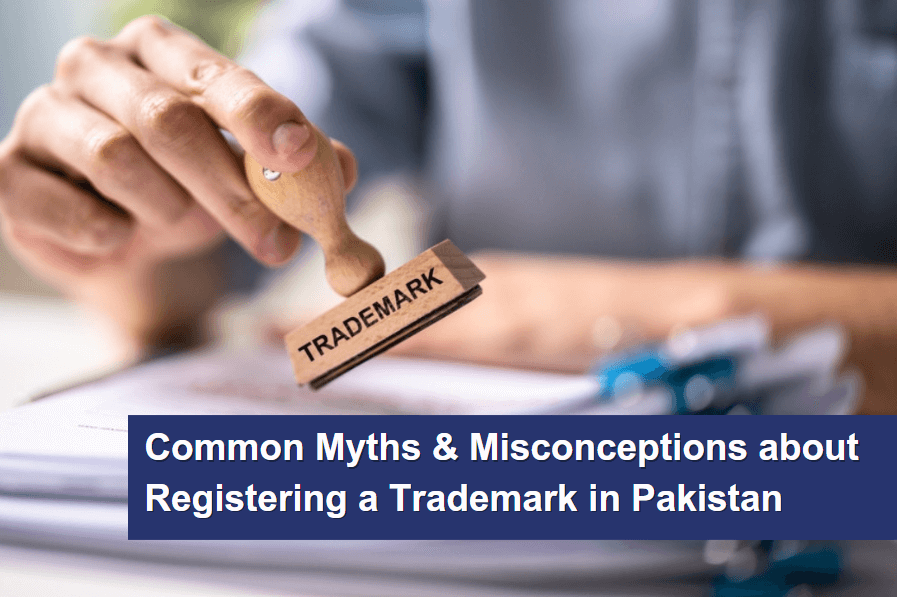In the world of protecting brand names in Pakistan, some common misunderstandings can make things tricky for businesses. In this blog, we aim to clear up these confusions and help businesses understand the ins and outs of trademark registration in Pakistan.
From explaining the difference between common law protection and formal registration to busting myths about costs and necessity, we’re here to make the process easy to understand.
Myth 1: I Don’t Need to Register My Trademark – Common Law Protection is Sufficient
Common Law Protection vs. Registration: Navigating the legal landscape in Pakistan requires a clear understanding of the distinction between common law protection and formal registration.
Common law provides limited recourse in case of trademark infringement, making formal registration with the Intellectual Property Organization of Pakistan crucial for robust legal standing.
This distinction empowers businesses to safeguard their intellectual property rights proactively.
Myth 2: “Once Registered, My Trademark is Protected Forever”
Duration and Renewal of Trademark Protection: Registering a Trademark in Pakistan comes with a specific duration. Once a trademark is registered in Pakistan, it is valid for a period of 10 years from the date of application.
Businesses must be aware of the renewal procedures to maintain continued legal protection. Knowing the temporal limits ensures businesses can strategically plan for the ongoing safeguarding of their trademarks, preventing inadvertent lapses in protection.
Myth 3: “I Can Use Any Trademark as Long as It’s Not Registered”
Risks of Unregistered Trademarks: The assumption that operating with unregistered trademarks is risk-free is a common misconception. Unregistered trademarks lack the legal robustness and protection afforded by formal registration. Understanding the legal implications emphasizes the importance of pursuing formal protection to mitigate potential risks and disputes.
Myth 4: “Registering a Trademark Is a Lengthy and Complicated Process”
Simplifying the Trademark Registration Process: Contrary to the perception of a complex and lengthy process, trademark registration is navigable with the right legal guidance.
The process involves a comprehensive search for uniqueness, followed by the submission of necessary documentation to the IPO-Pakistan. The Trademarks Registry then examines the application for compliance and potential conflicts, leading to publication in the Trademarks Journal.
During this period, objections can be raised by interested parties. If no objections or successfully addressed, the trademark is officially registered, granting exclusive usage rights for specified goods/services.
Myth 5: “I Can’t Afford Trademark Registration – It’s Too Expensive”
Cost of Trademark Registration: Contrary to the idea that trademark registration is too expensive, businesses should see it as a smart investment. While there are fees involved, they’re relatively small compared to the long-term benefits.
The costs of registration are minimal compared to potential legal expenses if someone else copies the brand. Without registration, businesses might face expensive legal battles. Getting professional help during registration might add a bit more to the cost, but it significantly reduces the risk of mistakes or delays in the process.
Myth 6: “I Have a Small Business, and Trademark Registration Isn’t Necessary”
Trademark Protection for Businesses of All Sizes: Dismissing the notion that only large enterprises benefit from trademark protection, businesses of all sizes stand to gain significantly.
Small and medium-sized enterprises can level the playing field by leveraging trademark registration to secure their intellectual property rights, fostering a fair and competitive business environment.
Myth 7: “I Can Register Anything as a Trademark”
Parameters of Trademark Registration: Understanding the legal criteria and limitations for trademark registration is essential. Businesses need to make informed decisions about what elements to register, ensuring a strategic and legally sound approach to protecting their intellectual property.
Myth 8: “Trademarks Only Apply to Logos and Names”
Diverse Elements for Trademark Protection: Expanding the understanding of what can be trademarked goes beyond logos and names. Exploring the diverse range of elements eligible for legal protection ensures businesses comprehensively cover their intellectual property, providing a more secure foundation for brand identity.
Myth 9: “I Can Safely Use International Trademarks in Pakistan”
International Trademarks in Pakistan: The misconception that using international trademarks in Pakistan is without consequences can lead to legal complications. All types of businesses in Pakistan must grasp the global nuances of trademark usage and compliance to avoid pitfalls when operating in the international market.
Myth 10: “I Can Handle Trademark Registration Without Professional Assistance”
Professional Assistance in Trademark Registration: It’s important to clear up the notion that businesses can handle trademark registration on their own. Getting professional help is really useful for dealing with all the steps, making sure your business meets all the requirements, and following the best practices for a smooth and legally solid registration. Working with legal experts is a smart move to make sure your trademark is well-protected.
Final Take!
In this blog, we talked about registering a trademark in Pakistan and clearing up some confusion. Businesses need to know the rules and laws to keep their brand safe. Whether it’s learning that trademark protection doesn’t last forever or understanding why professional help is important.. By getting rid of these misunderstandings, businesses can make sure their brand is safe and contribute to a fair and competitive business world for trademarks.

